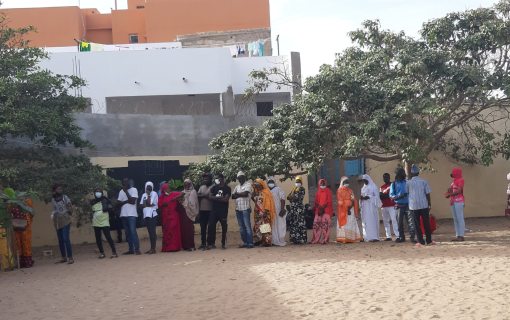Elections in Senegal: Understanding the Value of a Vote
On July 1, just three months after incumbent Abdoulaye Wade lost to current President Macky Sall in an election that restored faith in the Senegal's democracy, Senegal held legislative elections.
The IFES team provides insight into the election, which Senegalese hope will result in a parliament that can bring the country much-needed economic growth.
How was Election Day overall?
It was pretty much any normal Sunday with people going about their business as usual. The mood was calm. If not for small crowds outside polling places, you would not have known an election was taking place.
Polling was peaceful and the election was generally well-organized, other than a few isolated incidents. As usual, the media covered Election Day in all corners of the country. As soon as polls closed, they began announcing results polling place by polling place. Official results are not expected for a few days.
How was turnout compared to other parliamentary elections?
It is difficult to compare turnout in Senegalese elections over time since the number of registered voters has almost doubled over the past decade. The second round of the presidential election in March had a turnout of 55 percent. Legislative elections in 2007 saw a turnout of 34.7 percent, with major opposition coalitions boycotting. There are no official figures yet, but early trends indicate turnout will be extremely low.
Analysts have already started debating the causes for this low turnout. As Senegal reviews its constitution in the next year, there is likely to be a discussion on changing the electoral system for the legislative elections with the aim of bringing deputies closer to the communities they represent.
When can results be expected?
According to the law, provisional results from the electoral authorities should be out by Friday, July 6 at the latest, although there is a possibility results could be announced sooner.
Final results will only be announced after any and all complaints have been settled by the Constitutional Council. This will be July 16, at the latest. However, unofficial results reported in media outlets are showing a fairly accurate picture of what the next National Assembly will look like. President Macky Sall’s Benno Bokk Yaakaar coalition looks likely to take a majority of seats in the new National Assembly.
In the run-up to parliamentary elections, accusations of foul play were made by some of the parties. What effect did this have on the polls?
In general, the campaign period was peaceful with few incidents of violence. Political actors have faith in the electoral administration's capacity to deliver a credible election. With this in mind, it is unlikely there will be any major accusations of fraud or foul play that could impact the final results.
Senegal's democratic progress took a big step forward when President Abdoulaye Wade conceded defeat following the March presidential election. How did this peaceful transfer of power affect the people's faith in their electoral system?
The peaceful transfer of power in March was not the first in the country's history, since Abdoulaye Wadecame to power through a similar transition. The last election only reinforced a feeling in Senegal that the ballot box is the best way for people to have a say in who governs them.
The Senegalese are confident their system ensures that elections are administered fairly and that people's views can be accurately reflected through the outcome of an election. People now understand the value and power of their voting cards. Senegalese are fond of saying that they have been voting for over 100 years and that they have the longest history of electoral democracy in Africa. Senegal is the only country in the sub-region to have never experienced a coup d’état, underlining its citizens' faith in their electoral system's ability to reflect their views.









